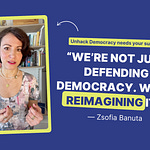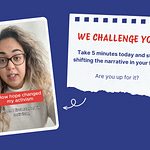Civil society is often seen as a force for democracy and human rights. In times of war, our sector is often seen as secondary to state power.
But Ukraine has shown us that civil society can also become a pillar of security and defence.
This edition of Spotlight On... draws on our recent online event, “Defending Freedom: Civil Society's Role in Ukraine's National Security.” It highlights and expands on ideas shared by:
Oleh Rybachuk, former Ukrainian Deputy Prime Minister for European Integration (2005) and now head of the Centre of United Actions
Olha Aivazovska, Chair of civil network OPORA and co-founder of the International Centre for Ukrainian victory
We explore how civil society helped Ukraine move from authoritarianism to democracy (spoiler: it didn’t happen overnight), laid the groundwork for national defence, and continues to play a critical role in resisting invasion, countering corruption, and offering lessons for civil society leaders across Europe and beyond.
Yup, all of that (and more!) is covered just below. ⬇️

1. Laying the foundations: how Ukraine’s civic landscape has shaped and been shaped by recent history
"We already had this very active civil society… therefore when the full-scale operation took place, civil society responded immediately."
— Oleh Rybachuk
Ukraine’s civil society didn’t spring up fully formed in 2022. It grew over decades, shaped by two major people-powered uprisings:
The Orange Revolution (2004–2005) mobilised activists, civil society organisations, politicians, economic players, the armed forces, media, and everyday citizens. It revealed the power of small individual acts of courage and resistance to transform a country.
Ten years later, the protests around the Maidan Revolution of Dignity (2013–2014) were just as formative. One might even say things got a bit wild!
Maidan was not just a protest, but a creative explosion. People came dressed as superheroes. Darth Vader ran for mayor. Barricades became installations of resistance. Protesters pointed mirrors at riot police, holding up signs that read, “God, is it me?” Graphic designers met on Facebook to create viral protest art (like the now-iconic Yanukovych portrait with a red clown nose).
“Participate, don’t spectate,” became a motto. The streets became self-organised spaces of liberation. Some called it a ‘tactical carnival’, and it helped bring down a government.
💡 The idea was clear: decentralised, citizen-led movements could protect democracy better than any top-down authority. Civil society became a powerful, independent force.
Groups like OPORA (Ukraine’s leading domestic election observation network and democracy think-tank) helped build resilience by dispersing leadership, as Olha Aivazovska shares: "In those days we had an idea that horizontal institutions would protect us from external forces. If a government tried to imprison one leader, the entire movement wouldn’t collapse."
She compares civil society organisations to partners in a healthy relationship: “They don’t have to look at each other all the time, but they need to look in the same direction. That’s common values.”
The 2014 Russian invasion of Crimea accelerated this decentralisation. Local governments, civic groups, and individual citizens all stepped up. Much of what Ukraine achieved in terms of defence, governance, and anti-corruption since then emerged from civil society.
So when Russia invaded in 2022, civil society didn’t just react, it led.
2. Filling the gaps: How civil society has stepped in for the state
"Civil society can replace even some weak institutions."
— Olha Aivazovska
Civil society in Ukraine has done more than just step up. In many cases, it stepped in. Replacing key state functions. Supporting the army. Funding defence. Running logistics. Innovating.

A key example is Come Back Alive, a charitable foundation set up in 2014 that procures military equipment and supplies. Ukrainians donate small amounts that add up to hundreds of millions of dollars.
In fact, in many brigades, 30% to 100% of critical supplies (like drones, medical gear, and protective equipment) actually come from CSOs and volunteers.
A recent report from the Sahaidachnyi Security Center called this support measurable, strategic, and often life-saving.
Come Back Alive has earned public trust through full financial transparency, and volunteers and non-profits remain the most trusted groups in the country.
💡 Civil society also has a unique ability to really get stuff done when bureaucracy lags.
When war broke out, U-Cycle (the Kyiv Cyclists' Association) and five partner NGOs launched the international #BikesForUkraine campaign.
In cities under attack, people needed to move and fuel was scarce. So they crowd-sourced bicycles for humanitarian workers, doctors, and volunteers. Not your typical emergency supply chain, but incredibly effective.
And these are just two of hundreds of citizen-driven initiatives, strengthening democracy at home and abroad.
At the international level, the International Centre for Ukrainian Victory was launched by civil society leaders to push reforms and accountability beyond Ukraine’s borders. As Olha says bluntly: “We often know more than politicians about what’s happening on the ground.”
"If you want change, you need to help produce it."
— Olha Aivazovska
This is what civil society looks like as an integral part of a country’s infrastructure.
3. Freedom versus security: why not both?
“A very important conclusion for others, even in times of war, is that there could be a balance between democracy, security, and defending peoples’ rights and freedoms.”
— Oleh Rybachuk
And how about now?
Martial law has suspended elections in Ukraine, but it hasn’t stopped civic work. Civil society continues to defend rights, while supporting the national effort.
"Even under curfew and Martial law, many freedoms in Ukraine are still protected. Government shouldn’t use war as an excuse to take away rights."
— Olha Aivazovska
Civil society plays a crucial role in holding this line. OPORA has spent the last two years preparing for eventual post-war elections, which includes:
Advocating for election cybersecurity
Drafting laws to ensure participation of displaced citizens
Preparing protections against disinformation and foreign interference
They’re not just asking Parliament to act. They’re handing it fully baked solutions: "We draft laws, offer expertise, and provide data-driven solutions,” says Olha.
💡 Ukraine has shown the world that democracy and security do not need to be in conflict, and that the best defence of democracy is… actually practicing democracy.
Here civil society can (and must) play a crucial role in supporting the war effort while continuing to hold the government accountable.
This is a powerful reminder that democracy can survive war—but only if people fight for it.
"If you want change, you need to help produce it. We don't just ask Parliament to act. We draft laws, offer expertise, and provide data-driven solutions."
— Olha Aivazovska
Designing democracy under pressure: Takeaways for changemakers everywhere
"It was a great slogan of NATO during the Cold War: ‘Are you ready to fight tonight?’ That’s the mindset civil society needs. If we are not ready today, tomorrow may not come."
— Olha Aivazovska
💡 Ukraine’s civic ecosystem challenges assumptions about the limits of civil society, and is a masterclass in civic strategy.
It offers a new blueprint for us:
Democracy and defence are not enemies. Civil society can lead in both!
Don’t wait for the state. Find gaps and fill them.
Art and culture can mobilise. Resistance is also emotional, visual, and innovative.
Decentralisation protects movements. Horizontal networks prevent collapse when leaders are targeted.
Civic action can build trust, coordination, and resilience before and during war. Build trust. Provide solutions. Draft policy. Inform voters.
In crisis, act fast and think local. Innovation isn’t always top-down. Sometimes it looks like a borrowed bike.
Protect rights, even under pressure. And especially when it’s hardest.

“Usually, the value of security is seen as conservative and traditional, while the value of freedom is seen as progressive and modern, which allegedly causes a constant conflict between them. This opposition is often used or manipulated by authoritarian and totalitarian regimes. They offer false security in exchange for real freedom. Ukraine’s recent history demonstrates that the values of security and freedom do not contradict each other.”
— Vakhtang Kebuladze, academic and philosopher
Thanks for reading REWIRE Democracy. Learn more about our publication.
















Share this post